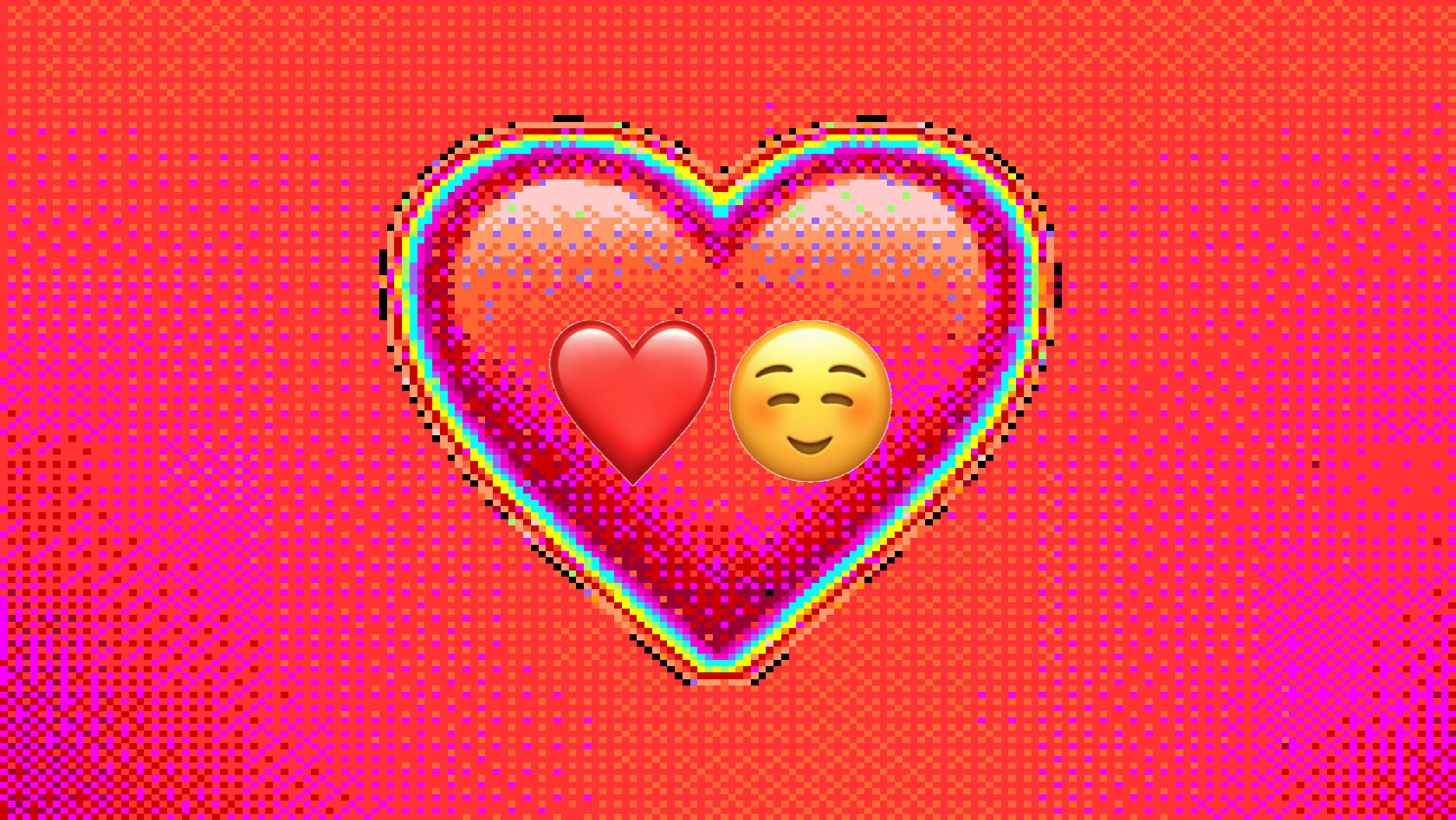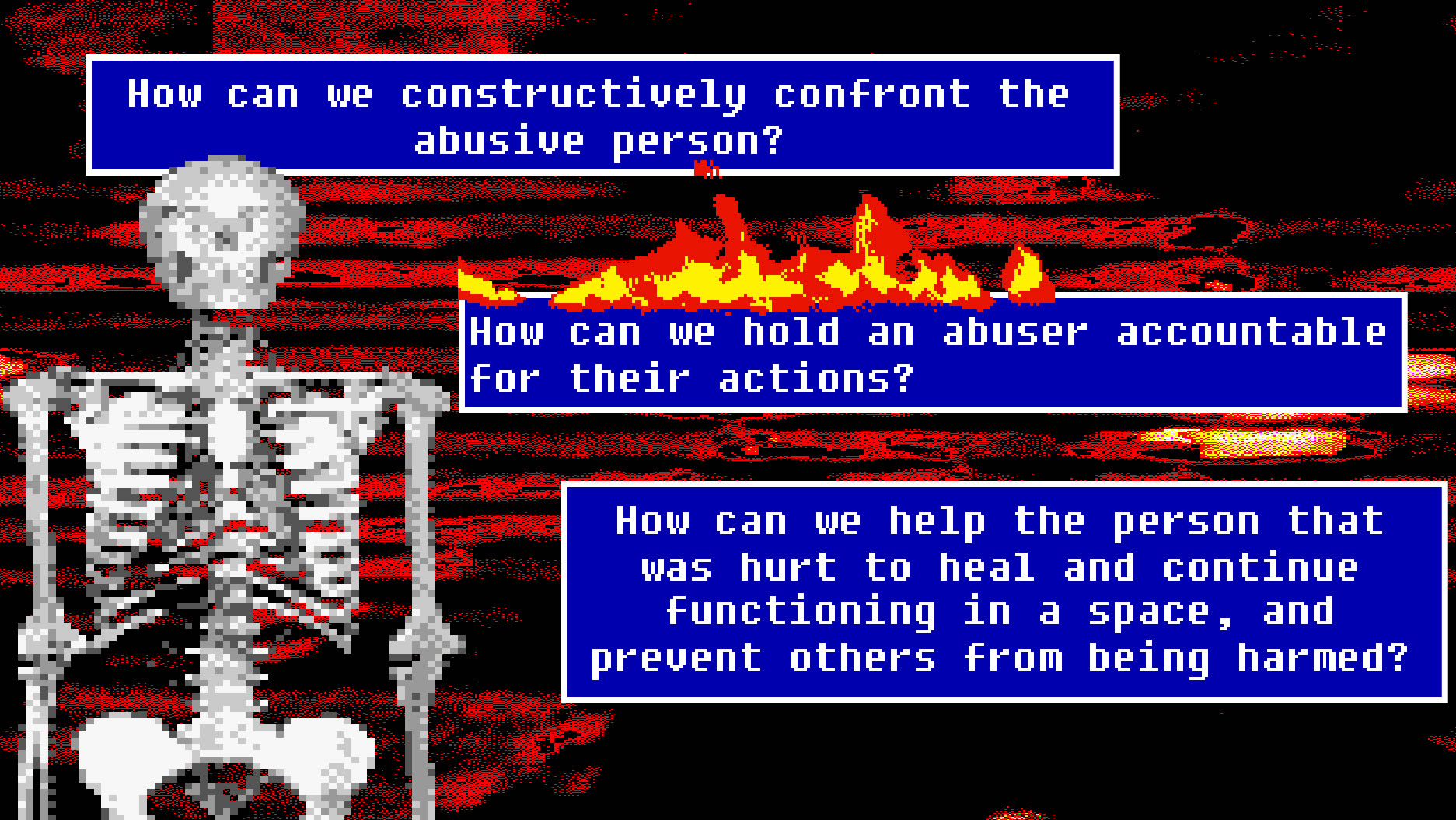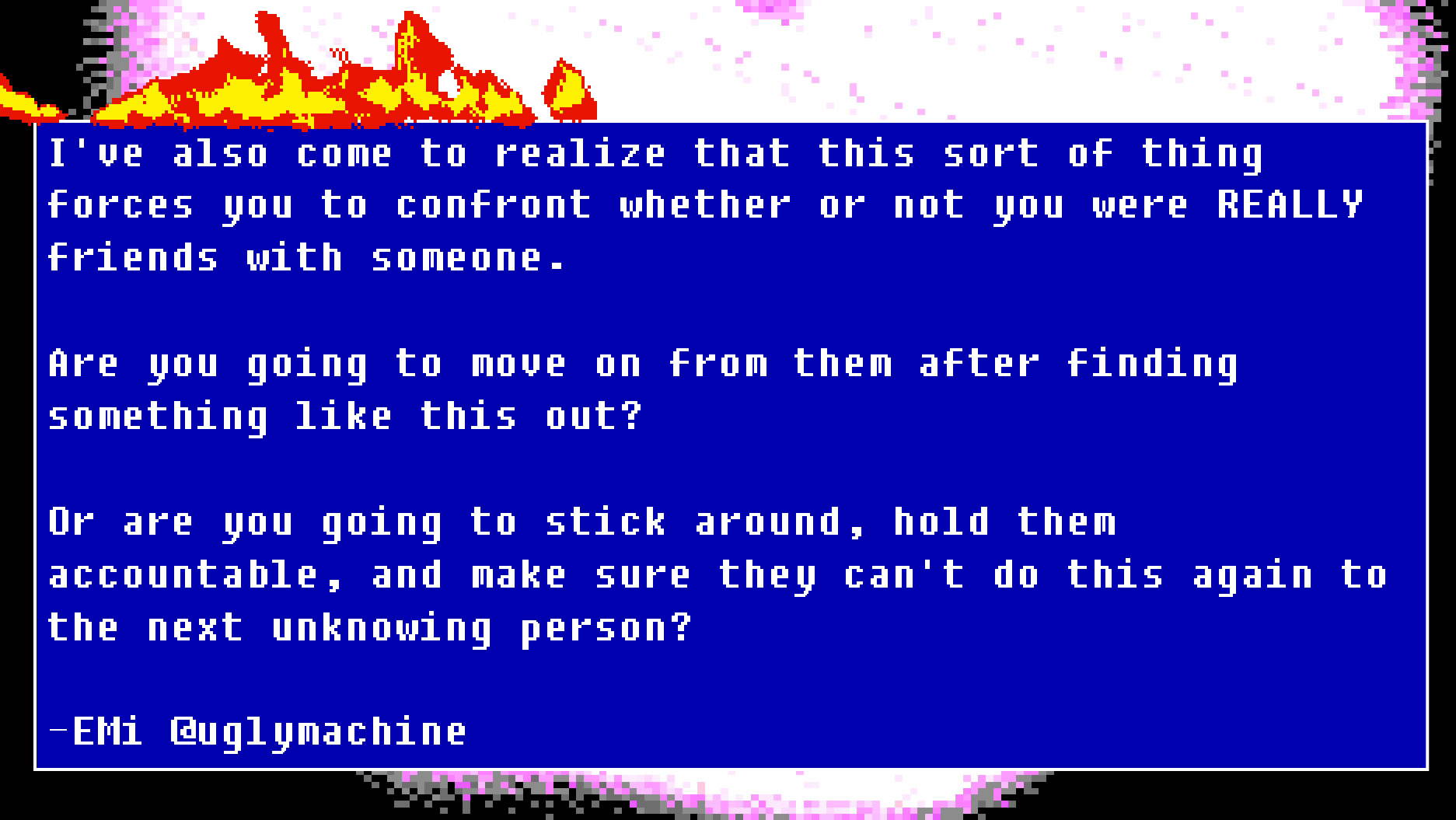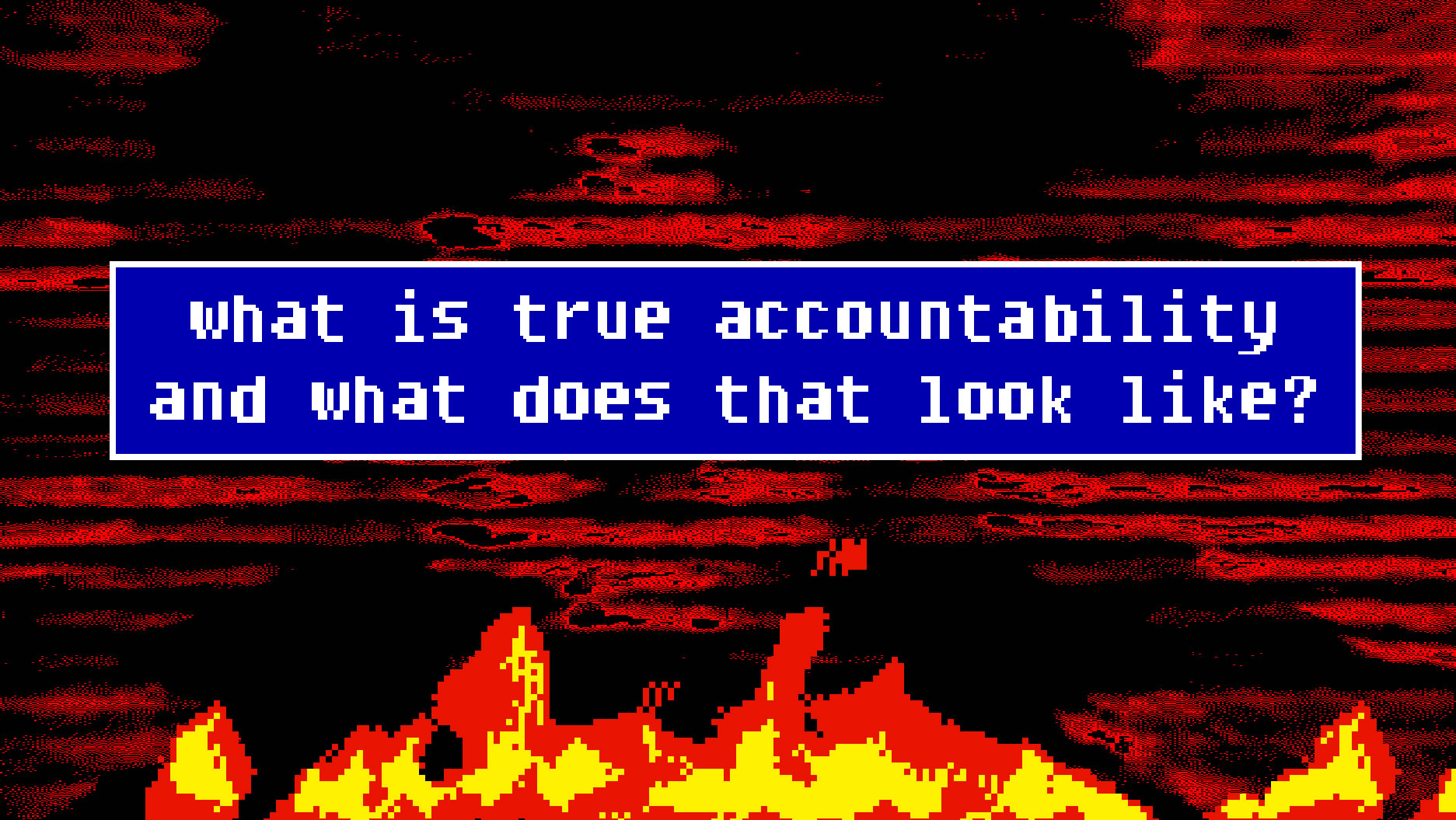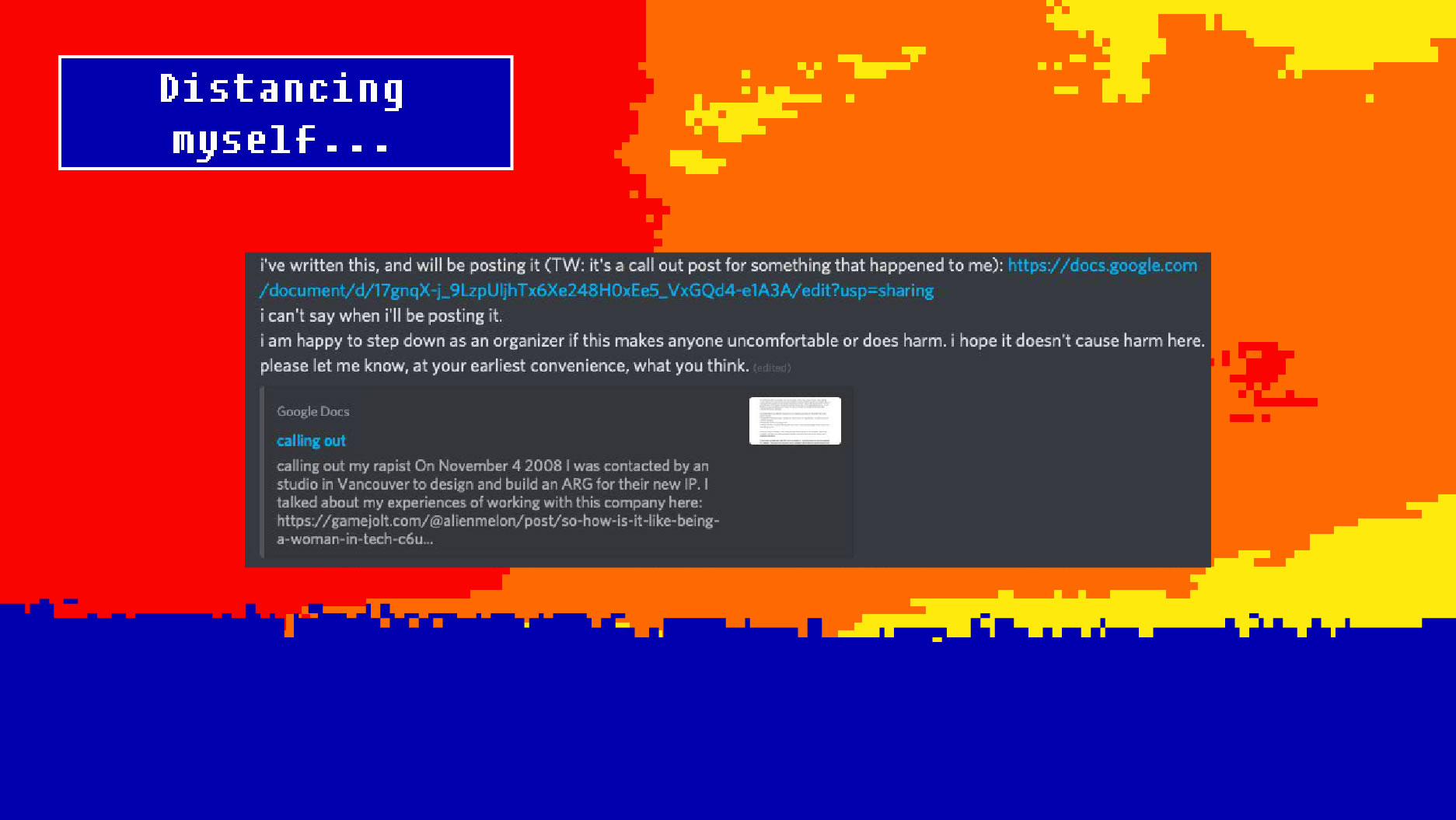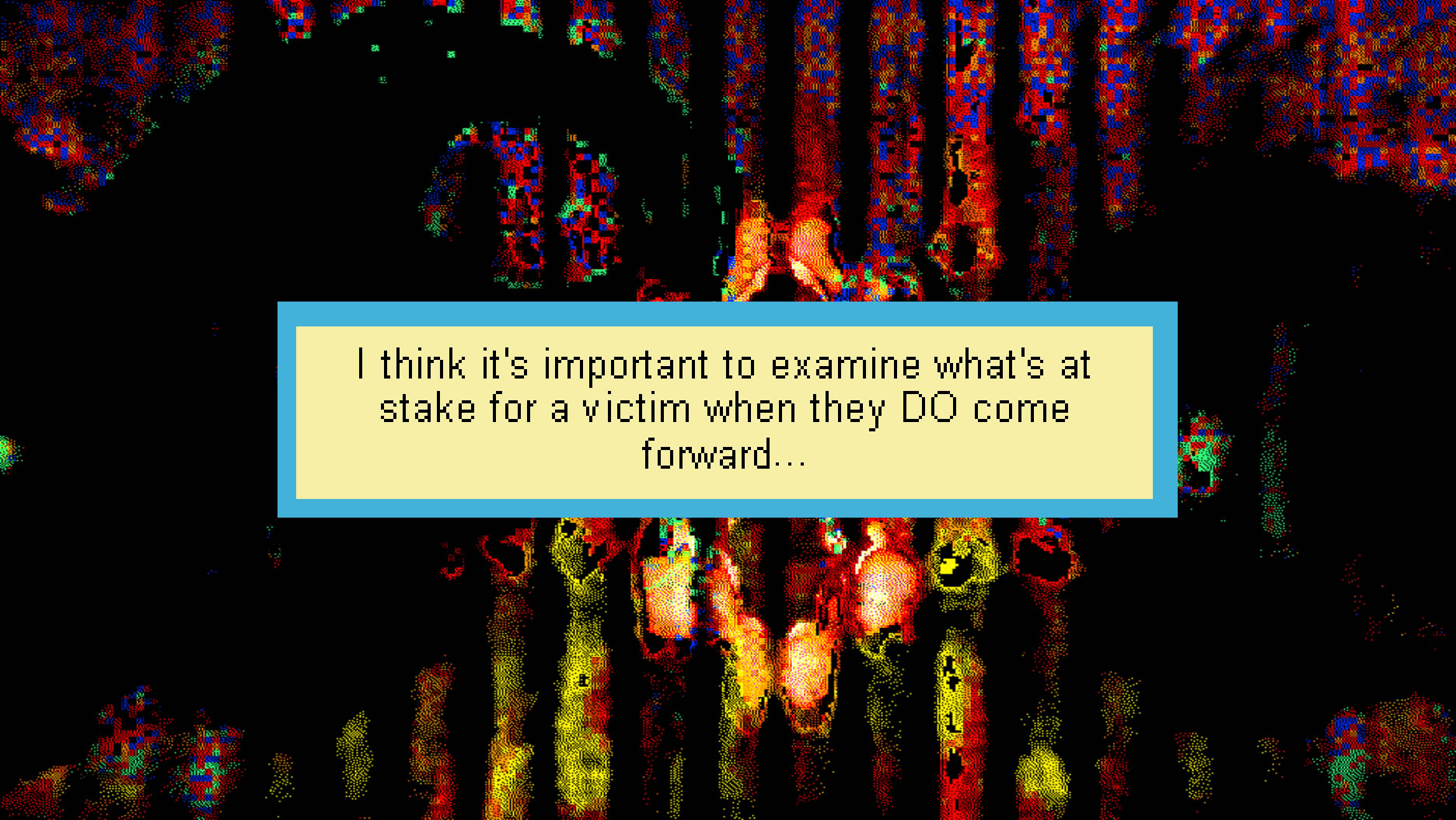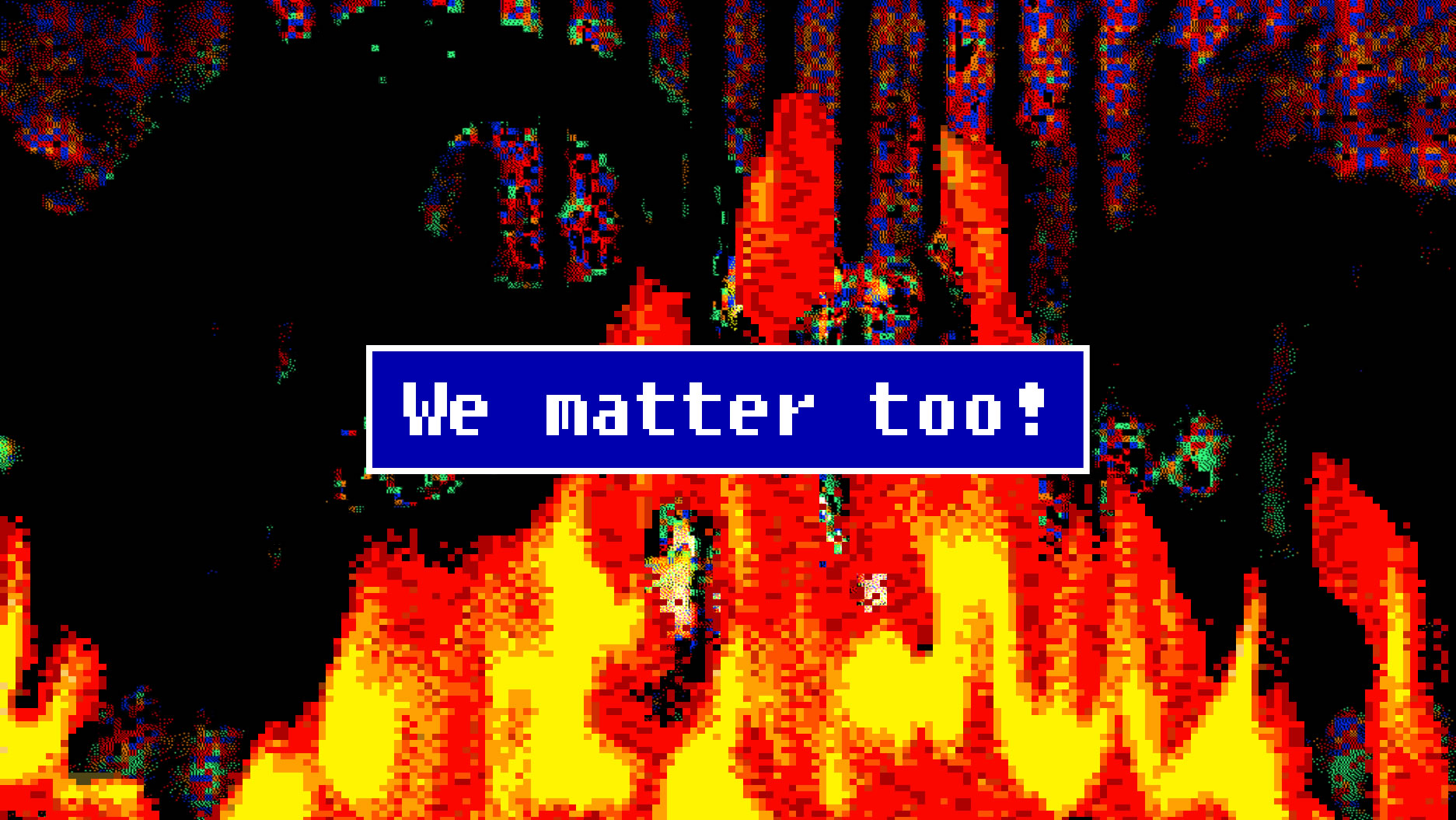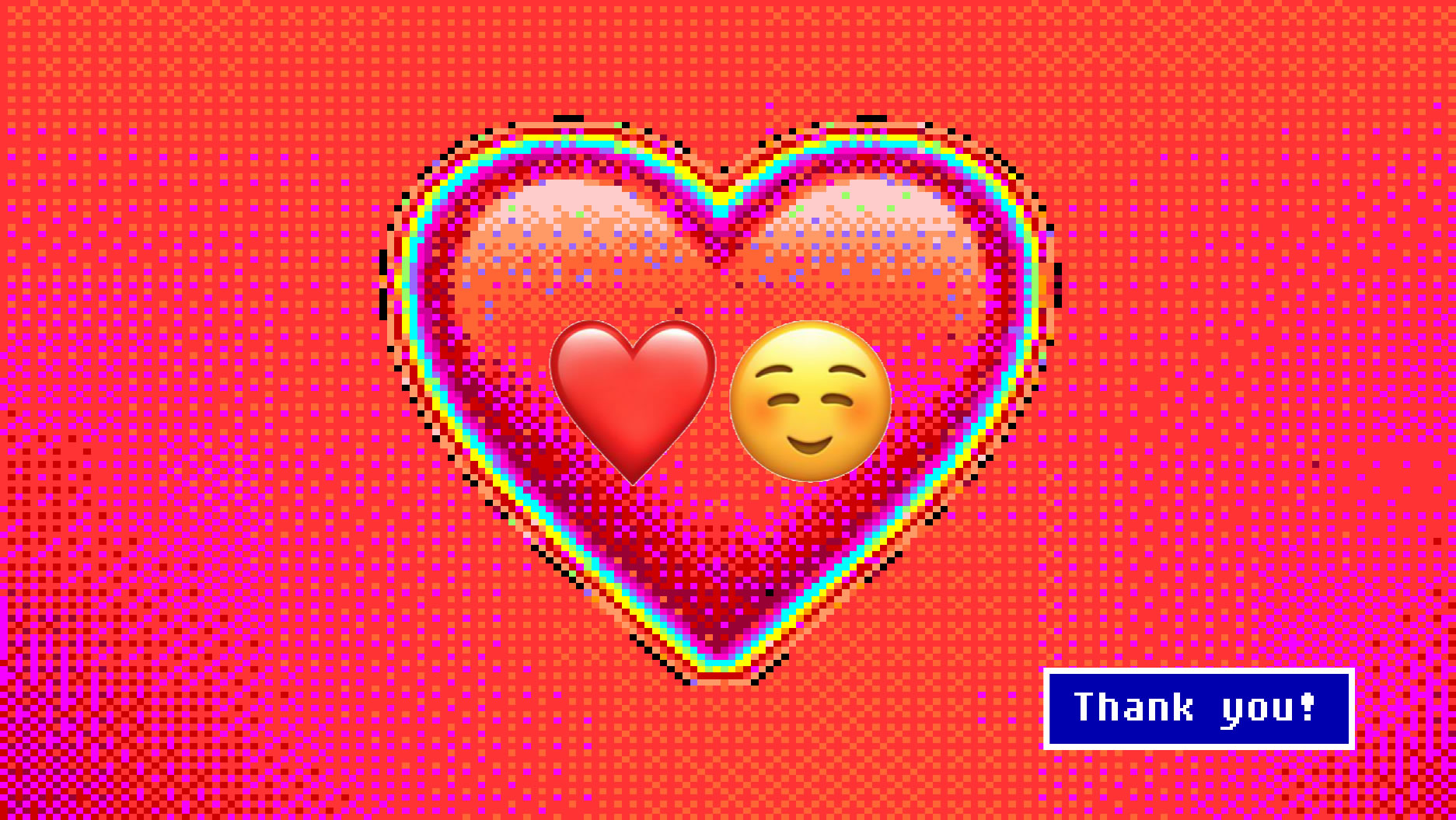Following is the full transcript of the keynote that I gave at this IndieCade Europe. I wrote everything out that I intended to say because this is a difficult thing to coherently talk about.
The message is very important.
Thank you so much to the IndieCade Europe organizers for making this happen and giving this message a platform.
About this talk:
This talk is about abuse in our industry.
The necessity of providing a safe space for survivors to come forward about abuse.
The equal importance of our community to constructively create accountability for those that cause harm.
—————————-
Hi everyone, my name is Nathalie Lawhead. I also go by alienmelon.
My pronouns are they/them. She/her is ok too but I prefer they/them the most, thank you so much!
I’m an art game designer and experimental software developer.
I started as a net-artist in the late 90’s early 2000’s and have been making stuff like this ever since.
My work ranges from games like “Everything is going to be OK”, and Tetrageddon, to things that try to explore how you interact with a computer and desktop, to experimental art software like the Electric Zine Maker.
The stuff I make is known to be very unusual. If you’re interested in checking it out you can visit my itch.io page or these websites…
It’s all donation based, and free.
It’s all very different. I’ve been making this kind of stuff for well over ten years so there’s a lot.
So ok, enough about me…
I’m not really here to talk about my work. I’m here to talk about what happened to me these last few months, abuse in our industry, the importance of creating a safe environment for victims to come forward about abuse, sexual assault, harassment, any variety of metoo story that is typically relegated to whisper networks, AND
how we, as a community, can heal and move forward in ways that are better for everyone.
So ok, small warning, this talk will go over abuse, trauma, and suicidal ideation. It’s about calling out abusers, and the discussions surrounding that.
I’m not sure what types of trigger warnings to put on this since I’ve kind of gone through a lot that pushed my own boundaries for what I thought is tolerable.
If you followed me on social media this August you’ll know what I mean.
I’m going to try to talk about this stuff as constructively as possible because it’s important to me that we all grow and become better as a community.
I would rather all this loss counts for something instead of moving on from it like it was just a small moment.
This sort of thing is something that a lot of people have experienced, but we are generally unaware of it because of the power dynamics that cause it to happen in silence.
This talk doesn’t offer a lot of answers.
I don’t really have those.
With this I hope we can start asking the right questions tho and coming up with answers as a community.
So, a little background…
This August I published a post titled “calling out my rapist”.
It talks about the professional and physical abuse that I’ve endured while working at two separate video game companies in Vancouver.
It’s a very long post. It’s an important type of story to read, and learn from.
Aside from it calling out a celebrity abuser in video games, I think it’s important to study it for how bad the work conditions in games can get, especially for bright eyed eager newcomers.
This industry can be notorious for burning through people. Those most at risk of it are young people that have no idea what they are getting into.
I hope by talking about stuff like this we can start coming up with ways to protect people from that.
Abuse isn’t only sexual.
A lot of predatory behavior comes coupled hand in hand with professional abuse.
I think it’s also important to start talking about how men get abused, that this is an equally as traumatizing thing that happens which we should start identifying, so men that are victims to such things can speak up safely.
Shaping a dialogue for these things is important.
So in my post, I extensively recount how I was professionally, and emotionally used, and then raped.
I’ll try not to use that word, and say “assaulted” instead because I hate that word.
I’m not going to go over all of what happened to me here, you can (and probably should) patiently read that post.
What’s really important to highlight tho, and what that post highlights, is the work environment that my employer was responsible for creating, which led up to me being assaulted.
While working at this company I had two ambulance trips to the ER.
One was from being overworked.
The company also cut corners on my paperwork for being in Canada, and being allowed to work there.
I was young, naive, and trusted them.
When they told me what to fill out on the immigration forms I did so without really asking questions. They told me that they would “figure it out” later.
The stuff I tolerated just to “keep this job” build up until I was in the middle of something intolerably bad.
I had no idea until it was too late.
Bringing this up, or even challenging my employer on that, would jeopardize a job that I desperately needed, so I said nothing.
This all set up a climate that made it incredibly easy for me to be preyed upon.
I think it’s important to also note that quite a few comments from women to my post were about how the same thing happened to them because of a bad VISA situation.
It’s all these tiny things that add up to making someone an easy target for an abuser.
By now the game industry is pretty outgoing about how bad the work situations are. I hope that we can keep talking about that so that such abuse of power, abuse of labor, and abusive work conditions are forced to change.
When I was assaulted, I could not go to the police and seek help.
I was already on thin ice at work because of the medical situations and visa situation.
I was too afraid of being kicked out of the country and losing my job so I never went to seek medical help or anything. I didn’t even know how or what to do.
Throughought all this I couldn’t seek help. I couldn’t reach out to anyone. I didn’t even know anyone in Vancouver that I identified as a friend that would care.
I was isolated, I was alone, and I was helpless.
This made me an ideal target.
Recalling all this to answer questions to people helping me fight the aftermath has been very difficult but also freeing in weird ways.
I was sent a cease and desist from the person that I called out in my post. I had to dig up a lot of things I spent a bigger part of ten years trying to so hard to forget.
I gave a Kotaku interview specifically about that (EDIT: please read this thread, and this thread before looking that up), and that was the first time I ever really talked to someone about it. I don’t think I was able to fully function after that, but there was a liberating sense about finally seeing this information out in the open. Like it wasn’t my burden anymore.
He’s everyone’s problem now.
As horrible as it has made me feel, having to dig up old conversations, and look at old emails, and seeing all this again made me think a lot about what could have been done better on part of the people that I worked with, and the men that I trusted, so this sort of abuse couldn’t have happened.
For starters, stop trusting powerful men when they rumor about helpless new people. Maybe ask questions and ask why they are saying damaging things about them.
Identify predatory behavior and get in the way of that.
Silence is the most destructive thing for a survivor to endure.
The weight that you have to cary.
The constant wondering that, because you can’t say anything, if he creates more victims how responsible are you for that? If you could only bring this to light you could stop other helpless people from falling prey to the same abusive person.
What if he’s really a nice person and you’re the only one that had this done to you. Maybe you really don’t mater enough and you should think of all the things he has to lose…
The feeling of seeing time go by over the years, and hating yourself for not mattering enough for something like that to even be wrong.
Seeing a man like that fall up and just thrive, wondering if he even feels for what he did to you.
There’s a lot of mental struggle that goes into reconciling with what happened to you. It’s very hard to break out of that, stand up for yourself, and realize that what was done to you is ON the person that did it.
They should pay these consequences. Not you.
There is so much about this that eats away at you and your dignity.
Surviving it is one thing, but bearing that weight is another.
The act of speaking. Just the act of finally saying out loud what was done to you is an incredible act of defiance for someone that endured such a thing.
You finally take your voice back, but you also claim the ability for you to protect others.
You know that it’s going to be harder for this person to create more victims.
Sometimes that’s all you can hold onto: the idea that you put this information out there, and now people that care to listen can take precautions.
That act of speaking up is a basic right that I hope we, as a culture and community, can safely extend to all victims.
We desperately need this because the culture, as it is, puts way too much of the burden on a survivor.
You are guilty for not speaking, and then you are guilty for speaking.
You are cross examined to what feels like an unfairly brutal extent, where the person that did this to you is pretty much fine. They can even lie and deny.
They usually bounce back. We lack social accountability.
Asking questions like “why didn’t you report this?” “why wait for so long?” and putting a survivor, their personality, and all their actions since, under a microscope of public examination places the burden of guilt on the survivor.
Culturally we imply that a survivor is guilty for speaking up because of hidden motives.
There really is no right or safe way of coming forward.
I think we would do better by replacing this type of questioning with asking how can we create a safe space for someone to openly talk about how they have been hurt…
How can we constructively confront the abusive person?
How can we hold an abuser accountable for their actions?
How can we help the person that was hurt to heal and continue functioning in a space?
And, very important: how can we prevent others from being harmed?
We are not going to accomplish anything by turning blind eyes, or assuming that this is work that someone else is doing or has to do for us.
For example, just sending an abusive person to therapy isn’t working.
Don’t just be “oh, ok!” when they say that they are getting help.
With some of the other stories that have been shared, I have to wonder if anyone is even checking in on this?
Why are they still creating victims?
Is the magic word for being confronted about horrible behavior “therapy” and people expect an expert to handle it?
We, as a community, need to hold them to higher standards and insist on better behavior.
Change is our responsibility too.
Follow up. Check in. Get in their face. Be a little annoying.
If this behavior goes unchecked people will just keep getting hurt, the abuser will just get better at being abusive, and things will escalate to such a point where the damage is irreparable.
There are a lot of lines that someone has to cross before they become a serial abuser, or rapist. This behavior escalates. Taking an abusive person, and putting them on a social or cultural pedestal, hurts them because it removes the ability for them to be accountable.
It takes a village to enable them.
If we’re active at confronting this behavior, we can stop harm.
The aftermath of my post has been intense I think.
A lot more people came forward about their own stories of abuse.
It’s not an easy thing to hear.
I think we should also understand that such stories aren’t news to a lot of women.
I’ve lost count of the amount of times where I was talking to someone at a conference, and then I get a worried DM from someone warning me about him, or accounting the abuse that was suffered under him.
This stuff gets really crushingly graphic too… things like spousal abuse, rape, beating, emotional abuse… sometimes one, sometimes all.
The people warning me offer proof too, because survivors want to be believed.
This isn’t the type of stuff people say lightly, and it’s more often than not brought up to me in a very apologetic way.
Like I’ll think less of them or be upset because they are telling me this.
The fear of speaking, even in confidence, is high.
These types of stories have existed in whisper networks for a long time.
Silence is incredibly damaging.
Whisper networks exist to bypass the public trial that a victim has to endure just for sharing.
They’re designed to bypass cultural and social silencing and shaming mechanisms that shouldn’t exist in the first place.
Whisper networks fail us because they don’t reach everyone that needs to know.
I wish SO MUCH that people would have warned me about the person that assaulted me.
The days after sharing my post were very hard because, it turns out, his behavior wasn’t news.
He extended inappropriate predatory behavior to a lot of women, and apparently this was common knowledge for years.
I WISH I knew.
I wish my boss told me THAT instead of giving me a sales job on how kind sweet humble and selfless of an individual he is.
I wish people stood up TO him when he was being inappropriate and gave me the chance to tell someone that he was pursuing me in a way that literally felt like I’m being hunted.
I couldn’t tell anyone. I couldn’t even try.
They needed him and his work because he was famous, and that would help their game, so they were willing to ignore a lot.
This power dynamic is dangerous.
Aside from the failure of the surrounding culture to do this properly in a publicly accessible way, I didn’t have a whisper network at my disposal.
I was too new. I was also too expendable.
This is a big way that these networks fail us. They just don’t reach new people fast enough.
The information in whisper networks also, more often than not, deteriorates to being “worst case” because that’s just the nature of word-of-mouth.
This isn’t good for people that are actually not monsters. They’re just assholes that people want to avoid working with.
It can easily create a lot of rumor and fear.
Our silence, and forced discretion, is hurting everyone.
We need a platform where a victim can safely speak up and safely share, in the open, so that our community can take precautions and constructively act on what is shared.
What I hate about my current situation is the fact that I was sent a cease and desist and am looking at being sued… This sends a bad message that silence is the best option for anyone.
Even in the case of other women and survivors, that have come forward with this, gamergate seems to have gotten a “second life” of sorts by going after them if their abuser accuses them of lying.
A white man saying that someone is lying, hurtful, or exaggerating about rape really brings out the men’s rights activists.
The burden of this shouldn’t be on the victims.
It feels like we’re alone in this.
It’s very hard to watch the post-callout culture returning to “not my problem”.
Being a victim, it’s particularly crushing to see this dynamic because nobody seems to really care. We’re really eager to “go back to normal” without addressing the issues and climate that create abuse.
If it’s happening in silence, it’s still happening.
Safely speaking is the first step to changing this.
If this is in the open, it alleviates the burden of this discussion from falling entirely on women, and places the responsibility on men as well.
Men can’t ignore these stories. Men HAVE to hear them.
If you can get past the inconvenience of learning that about your peers then maybe we can all work on positive change.
Women, and those vulnerable to abuse, can’t do this alone.
We need accountability and a way to discuss rectification.
This is a discussion we should start having, and questions we should start asking ourselves.
For example, as it has been up to now, someone gets called out, they write a public apology, and pin that tweet.
Time will go by and then they’re back. Nothing really changed. They say they are going to therapy since that seems to be the magic word to make things go away… either way, you hear that they’re making victims again.
Why?
I will admit that hearing an abuse story about friends or peers is not easy.
It’s really hard to learn that a friend hurt someone so horribly.
It’s easy to get defensive.
Some of this was also about people that I looked up to and liked being friends with.
After hearing this stuff, at some points, I wasn’t even sure anymore if I want to be in this space because who can you even trust, how do you go on, and can you even safely exist here?
The feeling of betrayal, disappointment, anger… we all feel when we learn this about someone is the same feeling that people have when a loved one is fighting with addiction and relapses. The way they will lie to you, hide things from you…
I think this is a good place to start when we’re even trying to make sense of the pain, the betrayal, the fear of what it means to be in this space, what it even means to continue supporting this work and enjoying this work, what is happening in our community, and how to even start approaching that.
Lets stop turning a blind eye to this and start paying attention to what is happening in our spaces.
While talking about some of this, a good friend of mine, Emi Spicer said the following and I think these are great questions to bring to the table… Quote:
“I’ve also come to realize that this sort of thing forces you to confront whether or not you were REALLY friends with someone.
Are you going to move on from them after finding something like this out?
Or are you going to stick around, hold them accountable, and make sure they can’t do this again to the next unknowing person?”
So I think these two questions are important things to ask ourselves.
If you learn that a friend, coworker, or peer, is abusive maybe instead of cutting them out completely we should be annoying and confront their behavior.
We should talk to them. We should point these things out to them. We should confront them and continue to confront them so their behavior CAN change.
If we did this, then we could get rid of that fear of people being falsely accused by someone.
We’re not ostracizing, boycotting, or turning people away. We’re confronting. They stay here, and they are required to be better people by the community that they are in.
I think that another question we should ask ourselves, as well as discussion we should start having, is what is true accountability and what does that look like?
An abusive person NEEDS peer pressure to change and stop doing what they are doing. Sometimes peers are the only people that can get through to someone like this because they don’t respect the people they hurt.
To me, true accountability is making right on what you broke. It’s restitution and making social or personal amends to the people that you hurt.
For example, in this industry’s case, that would involve the abuser backtracking and fixing what they broke for people.
Like restoring the professional damage done to a person.
If an abuser gossiped about someone and destroyed someone’s career (such was my case)… because their sexual advances where rejected, or for whatever variety of other reasons people do that… Then that abuser needs to go back, contact everyone they lied to about a person, apologize and admit to having done that.
Fix what they broke. Rectify someone’s ability to function in a space after they have been driven out because of their abuse.
It’s not enough to make a public apology, pin it, and move on.
Change is a complex process.
I was at a point, so often, when I wished that my abuser would admit to having lied about me and destroying my career. I wished SO HARD to get back what he took from me.
Even years after quitting both companies, I was hoping that my co-workers would email me and just acknowledge what had happened. What he was saying about me. How that wrecked my ability to work there, or enjoy success there.
Even just for the two companies to actually pay me the outstanding invoices that they still owed me.
Nobody did.
It would have made a big difference just to be told that I’m not crazy, and that what happened to me was wrong.
The painful part is to realize that abusive people get to just “move on” in every way, even to the next unknowing person to hurt.
The most that I got was my former boss running into me at GDC. He cheerfully threw himself at my group with a “Hey, Nathalie! Remember me?” and that’s a person that threatened to sue me, didn’t want to pay me, and treated me with a complete lack of humanity.
I think the lack of accountability contributes to people not really understanding the depth at which they hurt someone.
Not enough people are telling them that their behavior is hurtful OTHER than the people that they are hurting.
There are really no social repercussions for abuse.
I fear that, after a lot of these stories, an abuser having to leave a community is actually more destructive than allowing them to stay under the condition that they have to be constantly confronted for their behavior and expected to change AS WELL AS make amends.
Currently too much of the burden of change is on the survivor. Too much of the responsibility to bring awareness to an abusive person, and warn people, is on the survivor.
As a survivor, having to share a space with someone that hurt you this much is incredibly hard.
There’s no easy way to do this, but what is hardest about it is that nobody knows what the abuser did and nobody is confronting that (except for you, the survivor).
I don’t know what I would do if I had to share a space again with the person that I view as my own monster.
When I got the cease and desist from him for sharing my story the thing that I was the most afraid of was the idea of having to see him again when he sues me.
I literally would rather go to jail for avoiding court, than have to do that.
I don’t want to see him again. I don’t want for him to be real to me again.
Seeing his name in headlines next to mine was incredibly hard.
Seeing me being associated with him, in such a permanent and globally talked about way, is really hard.
I don’t ever want to see him again or have to talk to him or engage with him to any capacity.
It’s a lot to ask of someone.
AT THE SAME TIME I acknowledge and understand that, if we just drive people out and turn our backs on them, it makes it impossible for them to be accountable.
They will just go someplace else to be abusive.
They will never learn under these cultural conditions.
Abusive people will just gravitate to other abusive people and in a way this is how hate groups start.
Aside from that, everyone deserves the opportunity to grow to a point where they realize that what they did was horrible.
I don’t think that can happen with the codependent complicity that happens in our spaces.
The best people to challenge an abuser’s personality are those that an abuser might look up to. The people that hold some kind of social advantage over them.
So often, when I was in the middle of surviving the horrible situation that I was in, I wished that someone would have stepped in and said “hey man, that’s not cool!” when I was being treated like trash by my colleagues, or when he was saying really inappropriate things about me.
Just that would have been huge at the time.
Nobody did this, and I was alone to deal with it.
My own monster is not my problem.
I paid, more than enough, for what was done to me.
I wrote too much poetry about it. I carried the burden. I overcame the dehumanization and shame. I have the scars.
I’m officially done.
I had to pay for it. He was fine. He thrived.
People like him move on to other victims and just become better predators.
This dynamic is so wrong. Not just for me, but for everyone.
I should not be expected to carry more of this responsibility anymore.
It’s not on me to make him pay, report him, follow up, call out, or pursue any punishment to any capacity because I’m done paying for the personality flaws of an entitled white man.
I don’t have the energy to fight him, report him, and properly do all the things the internet has been asking me to do…
and, realistically speaking, other women that do have the guts to go through with reporting rape have to endure a lot of inhuman treatment for it, so our culture is really not conducive to this sort of thing.
We should start looking at the small changes that we can do to make this easier for victims.
For my abuser… He’s the responsibility of the composer community, and everyone else that was aware of his problematic behavior.
THEY have to act on the information that I brought to everyone’s attention. It’s not on me anymore.
This is where we need to make the discernment.
A survivor has done ENOUGH by sharing their story. That’s it. They survived it. They’re done. They don’t owe anyone more, or any other type of behavior.
We put unrealistic expectations on them when we ask more of them.
I mean, the lines of questioning I was subjected to, after this, was really hard.
I tried to answer most of that in my posts, which a lot of people attacking me didn’t really read.
I’m tired of answering questions or being asked to do more than just survive.
And we really need to stop being afraid of false accusations.
I get the fear of false accusations, but if our culture where structured right, that wouldn’t be an issue.
When someone speaks up, and we label them as “liar” for all the popular reasons that we do, or are suspicious of them for falsely accusing someone…
I think that fear of false accusations functions under the notion that “The System” will take care of the situation.
It’s expecting someone else to do what we should be doing, or thinking there is already a mechanism in place to handle that.
It’s a way of not being socially responsible for what happened in a space.
Without a community that understands power dynamics, and is willing to take responsibility for what happened, “The System” will always fail survivors.
In the end, the abuser just gets to go back to being what they were.
Someone like me has literally zero interest in lying about something like this… not even in private to friends.
It’s a horrible and ugly thing to be associated with. I hate that people know this about me. I don’t want to be known as a person that was assaulted by someone famous.
I risk to lose too much by speaking up.
That alone should be grounds for taking something like this seriously.
If you read my post, at the end, you get the frame of mind that I was in when I decided to publish it.
I was terrified of the repercussions. I honestly thought I would never be able to show my face at another indie game event again.
I contacted friends warning them that I was goin to go public about this (they didn’t know) and told them that I understand if they don’t want to be associated with me anymore and that I was willing to step down from participating in the things I was participating in.
I prepared to distance myself from friends so that they wouldn’t get hurt.
I got ready for losing my face here.
I didn’t expect to be believed.
The only thing I expected was to put information about him out there so, at the very least, others can be warned. I just couldn’t live with it anymore.
The most powerful thing that you can say to someone that was wrecked to this extent is “I believe you”.
It’s grounds for us all to move forward.
I can’t heal and he can’t grow if we gaslight, laugh at, ignore, shun, or victim blame.
It hasn’t been easy. I don’t think anyone coming forward really expects that.
We’ve already been robbed of our agency, and humanity, by having this done to us.
The public magnifying glass that you get put under is hard and can cause you to re-live a lot of this.
General culture frames a person that comes forward with accusations like this in such a way as THEY are the guilty ones.
A popular one to throw at my situation has been “innocent until proven guilty”.
I think this is interesting because, when you throw this at a survivor, you act like somehow you’re proving that a survivor is guilty of lying, having ulterior motives, or just generally guilty of coming forward.
Under our current cultural structure and preconceptions the survivor is ALWAYS guilty.
Saying things like “innocent until proven guilty” to defend the accused largely misses the point because, to me, he did this.
I live with it. I have the memory of it that I can’t get rid of. It’s part of my reality.
I KNOW, and it’s not a matter of guilt or innocence, it’s a matter of truth and speaking that so I can be free and others don’t have to suffer the same way because of the same person.
Someone like me is not asking for punishment.
Even that would imply that the survivor has to carry the added responsibility of seeking justice.
So much of this needs to stop.
The burden isn’t on the survivor. Stop punishing the victim for what happened.
Like I keep saying, the burden MUST be on the community.
The community needs to face this person. The community needs to rectify the situation and hold the person accountable.
The friends, co-workers, colleagues, bosses, peers of the predator need to confront the predator and hold such behavior accountable.
I do really believe that starts by de-platforming the abuser so that they cannot create anymore victims. Take away the power they hold over people.
And, you know, this is fairly common knowledge too… plenty of women have shared what happened to them when they actually had proof and actually reported it and actually went through all the right channels.
They still endured the same.
No amount of proof, or visible trauma, or emotional scars, seems to be enough so you have to wonder that maybe it’s not about “guilt vs innocence”.
Coming forward with this sort of thing is fairly brutal.
I think it’s important to examine what’s at stake for a victim when they DO come forward.
Just keep examining that.
THAT has to be part of the knee-jerk discourse instead of things like “innocent until proven guilty”…
I benefit in no way from this.
I do not want people to know this about me.
I do not want my friends to know or look at me differently.
It makes me sick to my stomach to know that I will be associated with this for the rest of my life. This gives gamers and online trolls a very personal button to push when they attack me, going forward.
I worked hard on building a reputation and standing here. I risked losing all that just to speak.
I would rather be known for my work and NOT for being assaulted by someone famous.
I spoke because I simply couldn’t live with it anymore, it was eating me up.
So… look at all these factors, and look at the risk as well as social punishment that happens when someone speaks up.
If you know how this is like, it’s cruel to say that a survivor is lying, especially when this sort of thing is so hard to prove to begin with.
The scope of this discussion has to be expanded.
We should examine why we even bend over backwards to protect abusive men and defend them like they mater so much and have so much more to contribute to the world.
I nearly lost my life to this because of the trauma.
It was very hard to continue living, feeling like I mattered so little.
That a person can just do something like this to me, benefit from everyone turning a blind eye, and throw me away when they are done…as well as trash any future of working in games for it.
This isn’t a soapbox. I don’t want people to feel sorry for me. I make a point to talk about the emotional repercussion because this is a reality for a lot of people.
I’m not the only one.
It was very hard to pick myself up again. I wouldn’t have been able to do that if it wasn’t for places like IndieCade and the indie community that gave me a space.
I (and others like me) have things to contribute to society too.
Examine the breadth of my work and then tell me that I don’t matter as much as him, or didn’t have things to offer too.
At the time, he mattered more than me, and that was a reality that I had to reject.
I’m not the only one that has gone through this or struggles with this kind of mindset after surviving.
In many ways, we create our own monsters.
We do this to powerful men.
In so many ways we are responsible for what they become.
We extend them constant benefit of the doubt. We excuse their abuse as part of some mystical process involved to making brilliant work.
We cover for them. We culturally protect them from their mistakes.
We don’t allow them to have consequences to their actions. By protecting them from consequences we are hurting them.
This creates very powerful abusers.
If we didn’t let them do this to begin with. If we held them accountable for their abusive behavior, as well as personality flaws, then they wouldn’t grow into being such untouchable monsters.
I really do believe that the only way to fix this power dynamic is to give the same platform, the same opportunities, the same language to be called a “genius” and to have brilliant work recognized, to marginalized developers.
Why don’t we so commonly call people of color “genius”? Why is our western ideal of “genius” always a white man?
Please call women of color “genius”. Make it a habit.
People of color, women, queer folk… literally anyone that doesn’t fit the mold of what our culture subconsciously recognizes as “successful”, really need to be given the same opportunity to shine. To be recognized, to be hired for how good they are, to just BE good enough.
If you aren’t a straight white man it’s really hard to comprehend how painful it is to watch peers that are less qualified than you just be given opportunities when you have to fight literally this hard, and survive literally this much, just to exist.
It sucks to be talked over.
That’s the power imbalance we need to shift. If we can address these issues, starting with how we even talk about work from marginalized developers, power abuse like this will become less of a problem.
For one abusive man, there are ten overqualified candidates to fill that cultural hole. Don’t worry about losing talent.
This all starts with telling victims, survivors, and marginalized folk that they matter too. Their contributions matter. They matter enough to stand up for.
So many women come forward with this sort of story.
They risk everything just to speak. They risk opening themselves up to more abuse. When they speak, this is something to take serious instead of picking apart.
Instead of diverting the conversation to “cancel culture” and being concerned about losing the contributions of an abusive person, we would do well to acknowledge the lost contributions of those that we don’t hear about because of abuse.
“Cancel culture” happened to victims first.
This isn’t just a women’s issue. This is everyone’s problem. Men need to hear these stories and use their authority to act on them. People at risk of abuse can’t fix this alone.
By continuing this cycle of abuse, you risk losing survivors to suicide too. We do lose them. We don’t hear about it because they never even got the chance to mater.
If I would have given in to my trauma, and killed myself, when I was just trying to pick myself up again, would anyone have cried for me?
I’m sure if anything the comment would have been “too bad, they had potential.”
I don’t think anyone would even know.
It’s the stuff that happens in silence that costs our culture the most.
The cycle of self hate that builds up over the years of just sucking stuff like this up is very real. Unfortunately when a survivor of abuse doesn’t make it, we don’t cry for them because we never hear their side of the story.
We’re unaware of what’s really going on.
Changing that starts by giving victims a space to share and be heard.
Thank you.
—————————-
